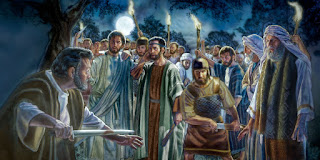John 2:13-22
In 2010, Mike and I went to the Holy Lands
with a group from Lutheran Seminary of the South – usually called “Southern
Seminary.” Each land we went to had its own money. We needed to convert US
dollars into Egyptian pounds. In Israel we needed shekels. Each time we
converted money, the exchange rate effected the value of our dollars, and there
was a fee for the conversion. It also was true that in both countries, the street
vendors were happy to take American dollars.
Today’s Gospel reading begins with Jesus entering
the temple compound. The scene probably looked like a souk, a Middle Eastern marketplace.
Jesus was objecting to the whole sacrificial system. The temple rules required perfect
animals, either brought from home or purchased on site.
If you were traveling long distances, from India
or Rome or Cairo, you wouldn’t bring your sacrificial animals with you. You
purchased your offering when you got to the temple. Foreign money, even the Roman
coins used in Jerusalem, wasn’t permitted in the temple. It was necessary to
change foreign coins into Temple coins, which were needed to purchase animals
for sacrifice.
In
the Gospels written by Matthew, Mark, and Luke, this event – the clearing of
the tables of the money changers – occurs during Holy Week. It is one of the
triggers for his arrest and death. But in John’s Gospel, it happens at the
beginning of his ministry. It is if Jesus is saying, “Here we go. Let’s get this
thing going.”
I wonder if Jesus was thinking this: Is it really necessary to have the
most perfect animal for sacrifice? Does this put a burden on poor Jews who have
to scrape up enough money to pay for the animals? Is it necessary to use only temple
coins in the temple? Haven’t the prophets said over and over again that God
wants our hearts not our animal sacrifices?
… Jesus begins his ministry in John by
overturning the tables and crates of the vendors. He yells at them, “God’s holy
temple should never be a marketplace! It looks like a souk here!”
Finally, someone challenges him. “Hey! What
do you think you are doing? Don’t you know this is God’s temple, God’s holy
place?! What gives you the right to do this? Prove to us you have the authority
to chase us away.”
Jesus replies, “Destroy this temple and in
three days I will raise it up.” I wonder if he says that while touching himself
on the chest – a subtle hint to what he really means. Of course, the people
take him literally. “So far, it has taken 46 years to build this temple. What
do you mean you can do it in three days?”
The text has a couple interjections. They
give us clues to what the disciples were thinking at the time, and how they
later gave the fuller meaning to his words that Jesus intended. After the
resurrection, the disciples could say, “Aha. Remember when Jesus said this?
Now, we understand what he was talking about! His body is the temple. Jesus
himself is the temple.”
At the time, there in the temple in
Jerusalem, they couldn’t imagine what Jesus was talking about. The temple was a
very solid building, built to last a lifetime.
As it turns out, 40 years later, Rome would
conquer Jerusalem and destroy the temple.
The destruction of the temple changed Jewish
worship forever. The sacrificial system centered on the Jerusalem temple was
replaced with worship in local synagogues. The sacrifice offered from then on was
and continues to be that of prayer.
… Our building is still here, but until a year
ago, we would never have imagined worshiping without being together in this
building. We would never have imagined worshiping without singing all the
verses of four songs plus the liturgical responses. We would never have
imagined worshiping in our pajamas, drinking another cup of coffee, from home
in front of a computer.
But we have learned a lot, this past year.
We have learned that we can worship God while we are separated by miles, yet
connected through the internet. That’s because we don’t worship the building, or
the familiar form of our liturgy. We worship God. We are the Body of Christ,
whether we are together or far apart. We are the Body of Christ with hundreds
of millions of others around the world, worshiping at home, or in the building with COVID
limits, just like us.
… Jesus said, “Destroy this temple and in
three days I will raise it up.” We worship Jesus because he died for us, and in
three days God raised him up from the dead. We worship Jesus … Amen







